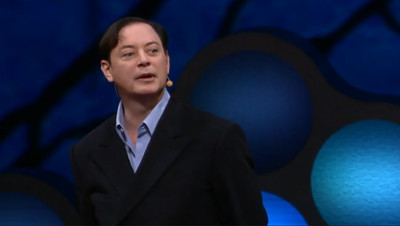I'm going to quote from another magazine of the'60s.
我要去引述1960年代,另一家杂志刊载的话。
This one is from 1968-The Atlantic Monthly, voice of liberal America-written by an important bioethicist.
这是1968 年出版的大西洋月刊,美国的自由主义之声,作者是知名的生物伦理学专家。
He said, There is no reason to feel guilty about putting a Down syndrome child away,
他说,对于遗弃唐氏综合症的婴孩,我们不必感到内疚,
whether it is put away in the sense of hidden in a sanitarium or in a more responsible, lethal sense.
无论是将其送到疗养院去,或者用更负责也更致命的方式。
It is sad, yes-dreadful. But it carries no guilt.
这很可悲,也很可怕,但不需要有罪恶感。
True guilt arises only from an offense against a person,
真正有内疚只源于侵犯人,
and a Down's is not a person.
而唐氏综合症患者不是人。
There's been a lot of ink given to the enormous progress that we've made in the treatment of gay people.
关于同性恋者处境的大幅度进步,已经有很多文章就此发表观点。
The fact that our attitude has changed is in the headlines every day.
每天都有头条报导,人们对同性恋的态度已有所转变。
But we forget how we used to see people who had other differences,
但我们遗忘了过去是怎么看待,不同于大众的人,
how we used to see people who were disabled,
忘了过去是怎么看待残障人士的,
how inhuman we held people to be.
忘了我们曾经多么不人道。
And the change that's been accomplished there,
在那些方面的改变,
which is almost equally radical,
几乎同样激进,
is one that we pay not very much attention to.
我们却未给予更多的重视。
One of the families I interviewed, Tom and Karen Robards,
我采访过罗巴兹家族的汤姆和凯伦夫妇,

were taken aback when, as young and successful New Yorkers,
他们当年是年轻有为的纽约人,
their first child was diagnosed with Down syndrome.
在得知他们第一个孩子患有唐氏综合征时大为惊讶。
They thought the educational opportunities for him were not what they should be,
他们认为儿子并未得到应有的教育,
and so they decided they would build a little center-two classrooms that they started with a few other parents-to educate kids with D.S.
于是他们决定成立一个小型教育机构,两间教室里,他们开始和其他的父母,一起教育唐氏综合症儿童。
And over the years, that center grew into something called the Cooke Center,
多年后,该机构发展为库克中心,
where there are now thousands upon thousands of children with intellectual disabilities who are being taught.
现在有成千上万的智障儿童在这里接受教育。












